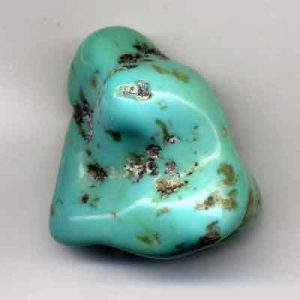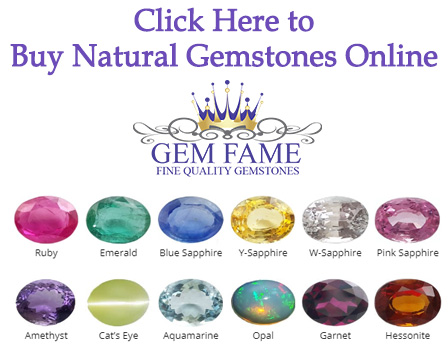Turquoise
Turquoise is typically opaque and available as massive material that is commonly used for cabochons, beads and carvings. The name Turquoise is synonymous with the name of the colour of the material. It is found in various shades of blue, blue-green and green. It may be a solid colour or veined with black or brown matrix and referred to as Spiderweb Turquoise. Turquoise is commonly simulated by other materials, both natural and artificial, that is often difficult to tell from the real thing. Turquoise may also be treated to improve colour. Turquoise is possible to the most popular non-transparent mineral in the jewellery trade. It has been in use as a valuable gem since at least 6000 BC when it was mined by early Egyptians. It has been used as a cultural, religious and ornamental gem by many cultures throughout history and is still very popular today.
There are many locations for good Turquoise specimens including Ma’dan, 45 km northwest of Neyshabur, Iran; Katonto, north of Kolwezi, Katanga Province, Congo (Shaba Province, Zaire); and Greenlee and Gila Counties, Arizona, USA.
| Chemical Formula: | CuAl6(PO4)4(OH)8·4(H2O) |
| Hydrated Copper Aluminum Phosphate | |
| Molecular Weight: | 813.44 gm |
| Composition: | Aluminum | 19.90 % | Al | 37.60 % | Al2O3 |
| Copper | 7.81 % | Cu | 9.78 % | CuO | |
| Phosphorus | 15.23 % | P | 34.90 % | P2O5 | |
| Hydrogen | 1.98 % | H | 17.72 % | H2O | |
| Oxygen | 55.07 % | O | |||
| 100.00 % | 100.00 % | = TOTAL OXIDE |
| Crystallography: | Triclinic – Pinacoidal |
| Crystal Habit: | Rare steep pinacoidal crystals, to 3 mm; fine granular to cryptocrystalline, nodular to globular crusts, veinlets, massive. Often found as pseudomorphs after orthoclase; also after apatite, bone and teeth. |
| Twinning: | None |
| Cleavage: | [001] Perfect, [010] Good |
| Fracture: | Conchoidal to Smooth |
| Tenacity: | Brittle |
| Moh’s Hardness: | 5.0 – 6.0 |
| Density: | 2.60 – 2.86 (g/cm3) |
| Luminescence: | None |
| Radioactivity: | Not Radioactive |
| Color: | Blue, Blue Green, Green, Green Gray, light Blue |
| Transparency: | Transparent, Sub-Translucent to Opaque |
| Luster: | Vitreous in crystals, Waxy to Dull in massive varieties |
| Refractive Index: | 1.610 – 1.650 Biaxial ( + ) |
| Birefringence: | 0.0400 |
| Dispersion: | Relatively Strong; r < v |
| Pleochroism: | Weak; X = colorless, Z = pale blue or pale green |
| Other: | Soluble with difficulty in HCl. |


